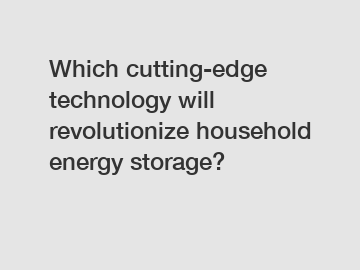Which cutting-edge technology will revolutionize household energy storage?
In recent times, the need for household energy storage has grown exponentially as we strive to reduce our reliance on fossil fuels and transition towards renewable energy sources. As technology continues to progress, we find ourselves on the cusp of a revolution that promises to transform the way we store and utilize energy in our homes. In this blog post, we will explore some cutting-edge technologies that have the potential to revolutionize household energy storage, offering unprecedented levels of efficiency, reliability, and environmental sustainability.
1. Advanced Lithium-Ion Batteries: .
Lithium-ion batteries have already proven their worth in numerous applications, including electric vehicles and portable electronics. However, ongoing research and development are continually improving these batteries, making them even more efficient and longer-lasting for household energy storage. Innovations such as solid-state electrolytes and silicon anodes show great promise in increasing energy density, longevity, and safety. With these advancements, homes will have access to more reliable and longer-lasting energy storage solutions.

2. Flow Batteries:
Flow batteries are a unique form of energy storage that offer the advantage of decoupling power and energy capacity. These batteries store energy in liquid solutions that can be easily replaced, allowing for easy scalability and longer durations of energy discharge. As technologies like vanadium redox flow batteries become more mature, households will have the ability to store large amounts of energy from intermittent renewable sources like solar and wind, thus ensuring a constant and reliable power supply.
3. Solid-State Batteries:
Solid-state batteries are emerging as a game-changer in energy storage. By replacing the liquid electrolytes of traditional Li-ion batteries with solid materials, these batteries not only offer enhanced safety but also deliver higher energy densities. Solid-state batteries are touted to have longer lifespans, faster charging capabilities, and improved thermal stability, making them an ideal choice for household energy storage. As research and development efforts progress, we can expect solid-state batteries to become more affordable and widely available.
4. Gravity-Based Energy Storage:
When we think of energy storage, we often overlook potential solutions based on gravitational potential energy. This technology involves using excess electricity to move massive objects against gravity, storing potential energy that can be later converted back to electricity. Disk storage systems, flywheels, and pumped hydroelectric storage are all examples of such systems. As we strive for more sustainable energy storage solutions, integrating gravity-based storage into households can offer a reliable and greener alternative to conventional battery technologies.
5. Hydrogen Fuel Cells:
Hydrogen fuel cells offer a unique and clean way to store and utilize energy. By combining hydrogen and oxygen, these cells generate electricity while emitting only water vapor as a byproduct. Hydrogen can be produced through electrolysis, which enables the extraction of renewable energy during periods of excess supply. This stored hydrogen can then be used in fuel cells to power homes when renewable energy sources are insufficient. With advancements in hydrogen production, storage, and fuel cell efficiency, this technology holds great potential as a household energy storage solution.
Conclusion:
As we move forward in our quest for sustainable and reliable energy storage, cutting-edge technologies continue to shape the future of household energy systems. Advanced lithium-ion batteries, flow batteries, solid-state batteries, gravity-based storage, and hydrogen fuel cells are just a few of the breakthroughs that are revolutionizing the way we store and utilize energy. With ongoing advancements in efficiency, safety, and affordability, these technologies will not only empower homeowners to become more self-sufficient but also redefine our relationship with renewable energy sources.
Embracing these cutting-edge technologies will not only reduce our carbon footprint but also offer greater energy independence, resilience during power outages, and cost savings in the long run. As we witness the rapid progression of these innovations, it is crucial for policymakers, researchers, and individuals alike to embrace this transformative era of household energy storage. Only through collective efforts and widespread adoption can we truly revolutionize energy storage and pave the way for a sustainable and energy-efficient future.
If you are looking for more details, kindly visit www.camel.com, camel group name, camel groupe.
216
0
0

Comments
All Comments (0)